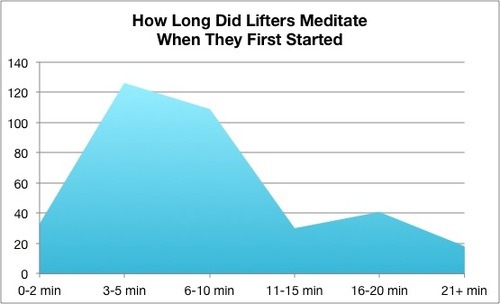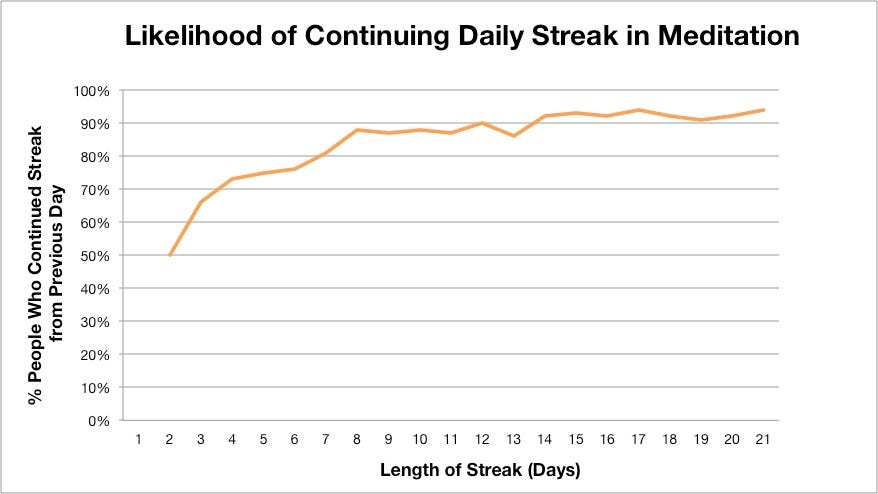How to Meditate
Below you'll find a guide that will teach you how to meditate. These are lessons learned from Coach.me's community of more than 80,000 meditators and 200 meditation coaches. For extra support, hire one of our meditation coaches.

What is meditation?
Meditation is a workout for your brain that strengthens your ability to focus.
Better focus leads to better performance, higher creativity, reduced stress, and presence: the ability to be fully immersed in a situation.
Why should I meditate?
Meditation has many cognitive benefits. Research even shows that meditation can alter the physical shape of your brain.
In our survey of the Coach.me community, people who meditated for at least one month reported:
75% said meditation improved their focus at work
90% learned skills that they could apply to other areas
73% experienced spiritual or emotional changes
When will I start feeling the benefits?
90% of meditators in the Coach.me community reported feeling benefits within the first two weeks. It's important to note that there can be multiple benefits, increased calmness, greater awareness of your own thoughts, and stronger control over your focus. You may not experience all three with every session.
How do I start meditating?
An easy way to start is by listening to a short guided meditation on your phone or computer.
We recommend starting with Coach Jeena Cho's Beginner Guided Meditation. She's designed it to be the perfect plan for beginners, since it starts with just one minute of meditation on your first day.
How can a coach help me succeed?
A coach can keep you accountable so that you practice consistently (this is more important than how many minutes you practice each day). They'll check in regularly to see how you're progressing and can give you tips when you are stuck, help you set the right pace, explain unfamiliar concepts, and suggest meditation resources. Hire a meditation coach.
"My coach has been truly amazing. I am so grateful. The accountability, insight, personal care, and friendly motivation has been a game changer for me." ~ Coach.me User
What happens during a guided meditation?
A coach will first ask you to get into a comfortable position. They might instruct you to close your eyes or look at the screen if there's a visual component.
Next, the coach will take you through mindfulness exercises. Popular ones include:
Breathing exercises
Bodyscans: you'll pay attention to different parts of your body, noticing how they feel and looking for points of tension.
Focus exercises: you'll notice your thoughts and practice letting them drift away.
Sensory exercises or meditation music: you'll look at images/videos or listen to sounds.
Affirmations: you'll listen to or recite positive statements about you or the world around you.
A guide is a great way to learn to meditate. Try one of Coach.me's meditation guides such as our 1-Minute Beginner Meditation, Calm, Buddhify, or UCLA's Mindful Awareness Research Center plans.
Do I have to stop thinking when I meditate?
No, the point of meditation is to get better at focusing your attention.
For example, if you're doing a breathing exercise, you'll try to focus only on your breath. It's universal that your mind will wander and that you will have trouble focusing. Over time, you'll gain better control over where your attention goes.
Many people report frustration when their mind wanders, but this is unnecessary. In fact, becoming aware of your mind wandering and then bringing it back to your point of focus is often the major activity of a meditation session.
What should I do if my mind wanders during a meditation?
When you notice your mind getting distracted, bring your attention back to your point of focus: your breath, the affirmation playing, or the visual in front of you. Don't get upset, just recognize that it happened and let it go.
How long should a meditation last?
Start with short meditations: 1-5 minutes per session is a great start.
The most successful meditators on Coach.me started with just 2-5 minute sessions and were able to accept that their mind would wander. People who failed to build a meditation practice had the opposite expectations: that they could sit down for 30 minutes with a perfectly clear mind.
In our study, success or failure in building a meditation practice was largely a matter of expectations. Short consistent sessions led to the most effective meditation practices.

Do I have to increase my session length in order to get better?
No, you'll get better with more frequent practice.
Meditation is similar to learning to play a musical instrument or speak a language. Frequent practice keeps your "focus muscles" in good shape. It's better to practice more frequently than in large chunks and a 5 minute session can be just as powerful as a 30 minute one.
There's no such thing as being good or bad at meditation, either. Every session is just practice. We do know that it gets easier to meditate after about 11 days of daily meditation; if you get that far, you have a 90% chance of continuing to meditate every day.

How often should I meditate?
As frequently as you can. Most coaches recommend meditating daily.
Always prioritize meditating more frequently over meditating for long periods of time. You’ll get more out of short daily practice than you will from a single long session each week.
What if I don't have time to meditate?
"You should sit in meditation for twenty minutes every day — unless you’re too busy. Then you should sit for an hour." ~ Zen proverb
It's okay to meditate for just 1-2 minutes if that's all the time you have.
Here are tips to fit meditation into a busy schedule:
Meditate as a work break instead of going out for coffee.
Wake up a bit earlier and meditate immediately upon waking up, or stay up a few minutes later and meditate right before bed.
Block out time in your calendar for meditation, so that you don’t crowd it out of your schedule.
Meditate on the bus/train (if it's safe!)
What time of day should I meditate?
Choose any time but try to meditate at the same time every day (it'll make it easier to build the habit).
Our research showed that people who meditated consistently felt benefits no matter what time of day they meditated. Meditating in the morning can be easier for beginners, since your brain will be filled with less thoughts than later in the day.
What position should I be in when I meditate?
Sitting is the most common position and many coaches will tell you to sit straight so that energy flows through your spine. However you sit, make sure you're comfortable. You can also lay down, just don't fall asleep!
Coach.me Poll: In what position do you meditate?

Meditation sounds like hocus pocus to me. Does it really work?
"Do not take meditation too seriously or to think of it as something really "out there". It's just a chance to reconnect with yourself and let your body rest, the same way sleeping does. I wish I had known earlier how simple it is it what a vast improvement it would make in my overall temperament." ~ Anonymous
There's a form of meditation out there for everyone and yes, it really works.
I'm bad at meditation. What can I do?
"In real life when you try [meditation] and you're not used to it, it feels very weird. My brain started jumping from one thought to another without any control like a wild horse. After a good week of doing it only 10 minutes per day things settled down and I could start feeling the difference it makes to my days." ~ Loic LeMeur
Most people think that they're bad at meditation when they first try it. You're not. You feel uncomfortable because you're learning a new skill. Your confidence will increase with practice.
Where can I meet other people who meditate?
Meet other people on Coach.me in the discussion section of each plan.
For in-person meetups, check out the Shambhala centers directory, Meditation Groups on Meetup.com, yelp.com, and do a quick google search for meditations in your area. You can also find It helps to talk to others about the new feelings and experiences you're having, so ask a friend to do meditate with you or talk to other people on Coach.me in the Discussion section.
For meditation retreats, ask a local center or meditation coach for their recommendation. The Vipassana meditation community hosts free 10-day retreats in different languages all over the world.
Do you have another tip? Share it with us.
Join Coach.me Tweet
Featured Meditation Coaches
Meditation changed my life. I wake up every day with more focus, creativity, and compassion and less stress and anxiety thanks to making meditation a daily habit. I can help you do the same. Tips and advice come from my personal experience meditating for 300 days in a row.
View Coach JohnMeditation is a personal thing, if you've heard about the benefits and been thinking of starting a practice -- I'll help you start or restart if you've tried but never felt you were "doing it right". We'll explore some options together to see what works uniquely for you in this moment. Sitting quietly, laying down, walking (great for those with ADHD), body scan and even guided meditations so you don't have to sit there just fighting with your thoughts. The important thing to remember is that getting distracted is part of the practice. Let's get started today, and by this time next week you can be celebrating your first streak! I'll be there to answer any questions you might have or point you in a direction to find them for yourself.
View Coach NathanFeeling scattered or overwhelmed? Not sure of what's next or what to do? Frequently feeling frustrated? Experiment with the wide range of benefits of training the mind. Together, we'll build consistency, creating more head and heart space to navigate daily life.
View Coach Makeda